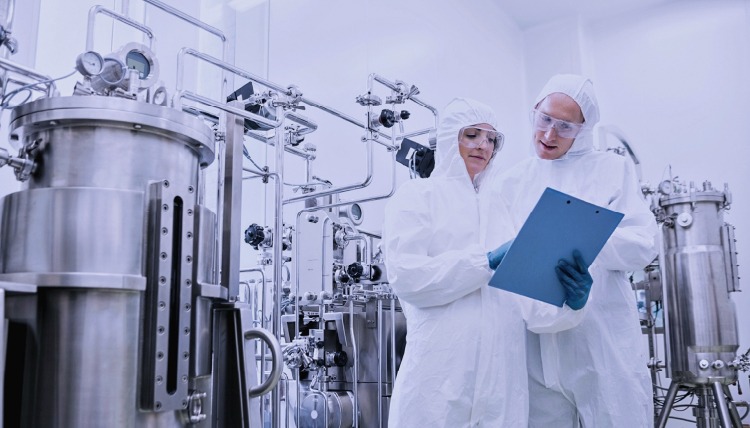Monoclonal Antibody Manufacturing for BioPharma: To Build or Outsource?
As the global biologics market continues to grow, securing speed with scale has never been a greater priority. Here we demonstrate important factors to consider in making optimal outsourcing decisions to deliver breakthrough therapies to patients, faster and better.
By Dan Slone, Head of DS Manufacturing
A company’s strategy is crucial for determining future success, and therefore, it needs to constantly change in line with market dynamics.
According to Coherent Market Insights, the global biologics market held an estimated value of $255.19 billion in 2019 and is expected to exhibit a CAGR of 7.6% between 2019 and 2027.1 Market indicators for monoclonal antibodies (mAbs) appear even stronger, with an estimated market value of $143.5 billion in 2020 and 14.4% CAGR expected over the same forecast period.2 Today, mAbs represent the dominant product class within biopharmaceuticals, driven largely by the increasing prevalence and increasingly sophisticated approaches to treating severe and complex diseases, including cancers. Additionally, in 2020, 55% of biologics reached the clinical stage (628 of 1133), with 426 products related to mAbs. Accordingly, most development-stage biologics today are mAbs or mAb-related.3
In recent years, the standardization of biologics manufacturing processes has given product developers multiple viable options for producing mAbs. These options include building an in-house mAb production system or partnering with a contract biologics manufacturer. Although building in-house does offer the advantage of direct control, the time, labor, and spend required to implement this often makes it the inefficient choice. Working with an innovative, strategic, and experienced contract manufacturer can help you make better use of valuable internal resources, leverage a deep pool of industry experience, and help you mitigate risk across development cycles, keeping you competitive in a rapidly evolving market.
The process of selecting the right CDMO partner needs to be performed after careful analysis of many factors: any of which, if overlooked, can create risk of delay or cost overrun. To stay ahead of your competitors as you execute go-to-market, consider the following parameters.
Speed to Market
As the global biologics market continues to grow, speed has never been a greater priority. Increased speed helps manufacturers provide breakthrough therapies and give new hope to patients. Additionally, product developers are racing toward market to beat aggressive competition. The market tends to remember and reward novelty, making first-to-market launches highly valuable. Additionally, the proliferation of effective biosimilars adds time pressure on long-term profitability, creating sharply defined peak-revenue windows within market cycles.
Accordingly, an ideal contract manufacturing partner should prioritize both speed and due diligence immediately following project execution. The goal here is to reduce total development time while preserving or improving quality. A complete technology transfer should occur as quickly as possible in a validated facility ready for immediate use.
At Samsung Biologics, for instance, we have invested the time and resources required to create a unique, world-class mAb manufacturing facility. Here, we connect all aspects of development to clinical and commercial production to form an integrated process. Our dedicated plants can produce mAb molecules at diverse developmental stages and (crucially) under critical time parameters. By architecting our platforms specifically for mAbs, hiring a team of experienced specialists, and keeping key components on hand (including raw materials, manufacturing materials, buffers), we have helped customers meet urgent project deadlines that would likely be impossible in a generalist environment.
Here is a real-world success story. Recently, we utilized our in-house developed custom Media Preparation Simulator Platform for a global biopharmaceutical client based in the US to reduce unnecessary time and effort. This proprietary platform was used in early-stage technology transfer to simulate and determine the best media solution for optimized cell culture manufacturing processes.
- With a necessary data set and a single click, our system automatically determines if the user’s pre-defined, prepared media set would prove successful, or if modification is required due to potential, unexpected risks.
- Risks that can be detected and eliminated using the platform’s media filter include pre-detection extractables and leachables, shortening technology transfer timelines and facilitating a higher batch success rate.
- By using our platform to choose the right media the first time around, we were able to complete the client’s tech transfer in three months and run commercial production in five months, securing emergency use authorization (EUA) from the FDA and bolstering COVID-19 treatments.
End-to-End Quality at Any Scale
Beyond speed, a quality manufacturing partner will be able to accommodate your mAb production at any developmental stage (such as cell line development, toxicology, Phase I-III, and commercial), saving you considerable investments in talent and technology. Be mindful that many manufacturers have a proven track record of success in one or multiple phases, but relatively few provide end-to-end capabilities to the highest degree of quality. Choose a manufacturer with the requisite experience and success stories of real-life client projects.
No matter what stage of development your mAb molecule is in, you need to be able to produce or exceed your target yield at your desired scale. Underperforming here drives up your cost of goods, hurting profitability. Equally important, however, is the ability to change scale of production at will. Many facilities are equipped to effectively manage production at one scale (such as early clinical, late clinical, and commercial), but not at others. This essentially guarantees significant time and productivity loss when unforeseen changes occur, creating notable risk.
A multiscale manufacturing facility, such as the dedicated mAb plant at Samsung Biologics, offers the distinct benefit of rapid, versatile scaling. If product needs change, a partner with a multiscale facility can pivot to meet your needs in little time, with all resources, supplies, and personnel already on-site. Additionally, by keeping operations in-house instead of outsourcing key steps, multiscale facilities further mitigate risk and potential bottlenecks following supply-chain contingencies. Having the capability to run in-house biosafety testing and lot release testing at a single mAb-dedicated facility provides efficient project management. This helps prevent unpredictable delays, which further ensures efficient end-to end-production at a global quality standard.
An Expert Partner
Finally, by working with an expert contract manufacturing organization, you forge a partnership that adds true value, both within your specific project context and for your organization.
Ideally, your chosen partner should demonstrate deep, proven knowledge, as well as project success, both for mAb production, specifically, and biologics production, more broadly. When unexpected challenges appear, efficient resolution requires focused discovery, robust strategy, and confident execution. By leveraging its dedicated knowledge, real-world experience, and passion for success, a high-value partner will help you proactively flag issues hiding in plain sight, as well as resolve issues that emerge during production.
Additionally, your partner should be able to provide regulatory support for your submission, helping you navigate dossier creation, submission, and revision. By offering both manufacturing and regulatory support, the right partner creates unmistakable value, given the capital investments required to staff both operational areas.
Finally, your partner should offer all capabilities and capacities required, at any scale required, with strategic, secure, end-to-end operations that eliminate site switch-over and help ensure quality.
Final Considerations
Speed to market, efficiency at scale, and operational knowledge bases are critical factors developers must consider when deciding to manufacture mAbs internally or through a contract manufacturer. Although going the internal route is becoming increasingly viable, it is expensive and laborious. Further, there is undeniable value in choosing the right manufacturing partner. Through intelligent investments in mAb-dedicated infrastructure and experienced personnel, your partner should deliver efficiencies that matter while mitigating project risks.
As the developers of a world-class mAb-dedicated, multiscale facility, Samsung Biologics offers its customers valuable technical and strategic capabilities that reduce time to market, improve efficiency, and solve costly problems along the way. Samsung Biologics proudly provides fully integrated services, including cell line development, commercial manufacturing of drug substance and drug product, and biosafety testing services all, from a single site, delivering our customers value, consistency, and peace of mind. We are capable of (and passionate about) guiding our customers through their entire biologics journey, from conception to commercialization, possessing a defined set of platforms and data gathered from countless technology transfers and commercial manufacturing engagements.
If you are looking to develop or commercialize a mAb product in an increasingly competitive marketplace, we are here to help you meet and exceed your goals.
Talk to the mAb manufacturing experts at Samsung Biologics: reach out to sbio.bd@samsung.com.
About the Author(s)
Dan Slone is a recognized industry expert with a demonstrated history of 30+ years working in biotechnology manufacturing and bioprocessing. As a head of DS manufacturing for Samsung Biologics, Dan is responsible for the overall operations and performance of upstream and downstream production. The responsibility of this position also includes ensuring leadership of GMP compliance in manufacturing operations, as well as regulatory site inspections in producing drug substances. Prior to joining Samsung Biologics in 2014, Dan held various management positions in manufacturing process, including GMP operation, tech transfer, and validation.
He can be reached at dan.slone@samsung.com.
About Samsung Biologics Co., Ltd.
Samsung Biologics (KRX: 207940.KS) is a fully integrated contract service provider offering development, manufacturing, and testing services, all from a single location. We provide highly tailored solutions to clients while meeting the evolving needs of the global healthcare industry.
With proven regulatory approvals, Samsung Biologics is a trusted CDMO partner of choice and is uniquely able to provide seamless offerings from cell line development to final fill/finish as well as laboratory testing services at every stage for biopharmaceutical products.
To maximize our operational efficiency and expand capabilities in response to growing biomanufacturing demands, Samsung Biologics is constructing a fourth plant, which will further advance the company’s standing as the world’s largest manufacturing facility at a single site— holding a 620,000 L total capacity upon completion. Our facilities are all cGMP compliant with bioreactors ranging from small to large scales. We continue to upgrade our capabilities to accommodate our clients by investing in single-use technology and additional aseptic filling capacity. To further expand our global presence, Samsung Biologics opened a new R&D Center in South San Francisco, which has been operational since October 2020. We are committed to an on-time, in-full delivery of the products we manufacture with our flexible manufacturing solutions, operational excellence, and proven expertise.
References
- https://www.globenewswire.com/news-release/2020/04/03/2011472/0/en/Global-Biologics-Market-to-surpass-US-456-83-8-Billion-by-2027-Says-CMI.html
- https://www.businesswire.com/news/home/20201016005169/en/Global-Monoclonal-Antibodies-Market-to-Surpass-US-368.8-Billion-by-2027-Says-Coherent-Market-Insights-CMI#:~:text=SEATTLE%2D%2D(BUSINESS%20WIRE)%2D%2D,period%20(2020%2D2027).
- Data on file, GlobalData



